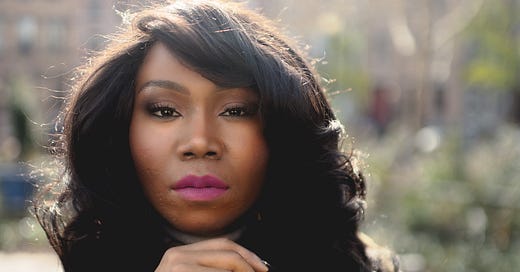Intimate conversations with our greatest heart-centered minds.
The first piece I read by Nicole Shawan Junior was No One Survives the Smoke which ran in Roxane Gay’s magazine. It’s about intergenerational crime trauma. Their prose was somehow elegant and even whimsical, yet the truths and the wisdom were pounding hard. It altered the cells in my body.
I quickly devoured everything Nicole had written and began following them on social media. What a glorious, radiant heart. What a laser-sharp, expansive mind. Their posts on nature and God and community and writing touched something deep within me. A longing for a more buoyant connection to the world in a steadier manner than I held. But I sensed arriving in this place had not been easy for Nicole.
Nicole was born in Bushwick, Brooklyn in the eighties. When they were a kid, their beloved father became addicted to crack jettisoning them and their mother into poverty, despite their mother working seemingly endless hours, and rattling any sense of trust in the world they may have fostered. Yet Nicole went on to become a lawyer, successfully prosecuting hundreds of domestic violence cases. They were the first civilian lawyer to administratively prosecute a member of the NYPD—and also led investigations and prosecutions of excessive use of force against NBA player Thabo Sefolosha, tennis star James Blake, and postal work Glenn Grays.
But in 2017, Nicole was in a predicament. They needed money to move from Brooklyn to Cleveland to start a new job as Executive Director of the Cleveland Community Police Commission, a police oversight organization established in 2015 as part of the terms of the Consent Decree between the City of Cleveland and the U.S. Department of Justice, but since they already carried substantial student loan and credit card debt, they didn’t have it. So they forged some travel receipts and ended up being indicted for telecommunications fraud and sentenced to eighteen months of probation. This changed everything. And in true Nicole style, it changed everything for the better.
Nicole is the founder of Roots. Wounds. Words.: A Literary Arts Revolution which offers pedagogy, performance, and publication opportunities for BIPOC writers, especially those who are also justice-involved, poverty-born, queer, trans, nonbinary, disabled, and otherwise marginalized. Their work has appeared in Guernica and SLICE Magazine, and elsewhere. And they recently started as Deputy Director of PEN America's Prison and Justice Writing Program.
We chatted about dissipating shame, the compassion of our ancestors, and how it can be healing to ignore low-vibration bullshit.
You’re deeply spiritual. I wondered if we could start here. You practice the Yoruba faith, correct? How would you describe the essence of these teachings? And what draws you to them?
The Yoruba people are based in West Africa, specifically Yorubaland which is Nigeria, Benin, and Togo. From that cosmology is a spiritual practice that involves one God, but also a whole bunch of deities who assist us humans in our experiences while we are spirits in embodied flesh. It also incorporates the practice of communing with and seeking guidance from our ancestors. In addition to these deities (which are mainly aligned with natural forces: water, ocean, river, wind and lightning, and all these kind of things) there is a strong belief that our ancestors are helping to usher us through this lived existence, along with spirit guides. We are working with them, in order to ascend spiritually, if you will. To get as much knowledge as we can. To be compassionate, to be of service to community, to be creative, all these things. We're working with both our ancestors and our deities to accomplish the mission for us to be here, in this plane, on this earth, at this time.
Are our ancestors and the deities working with the wind and the water? Are those their vehicles to help us?





